STAMPA
PRESS
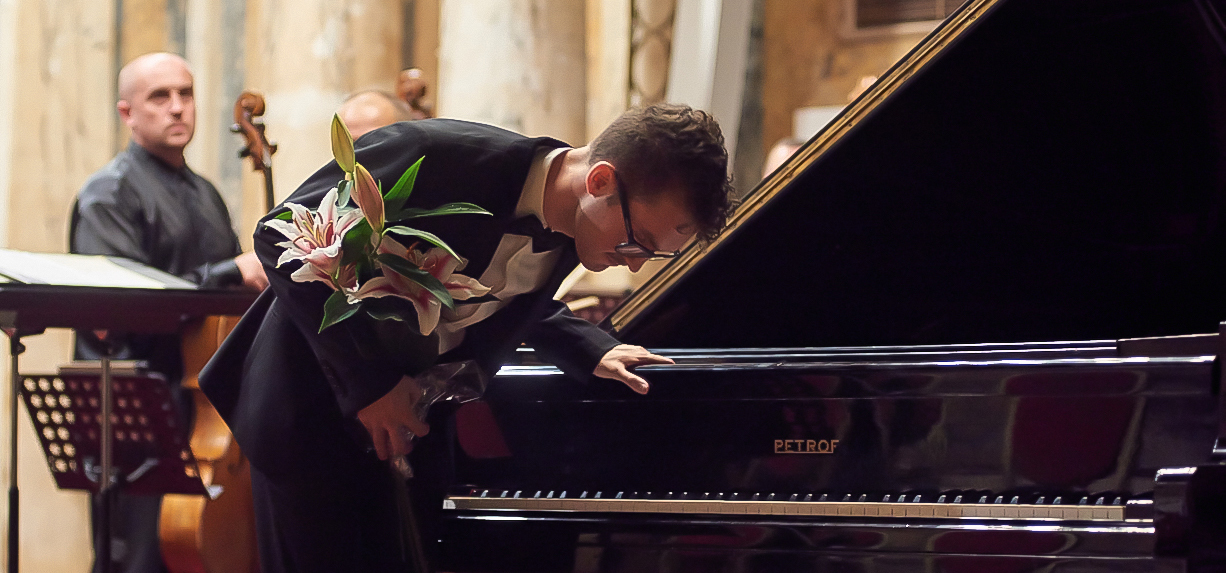
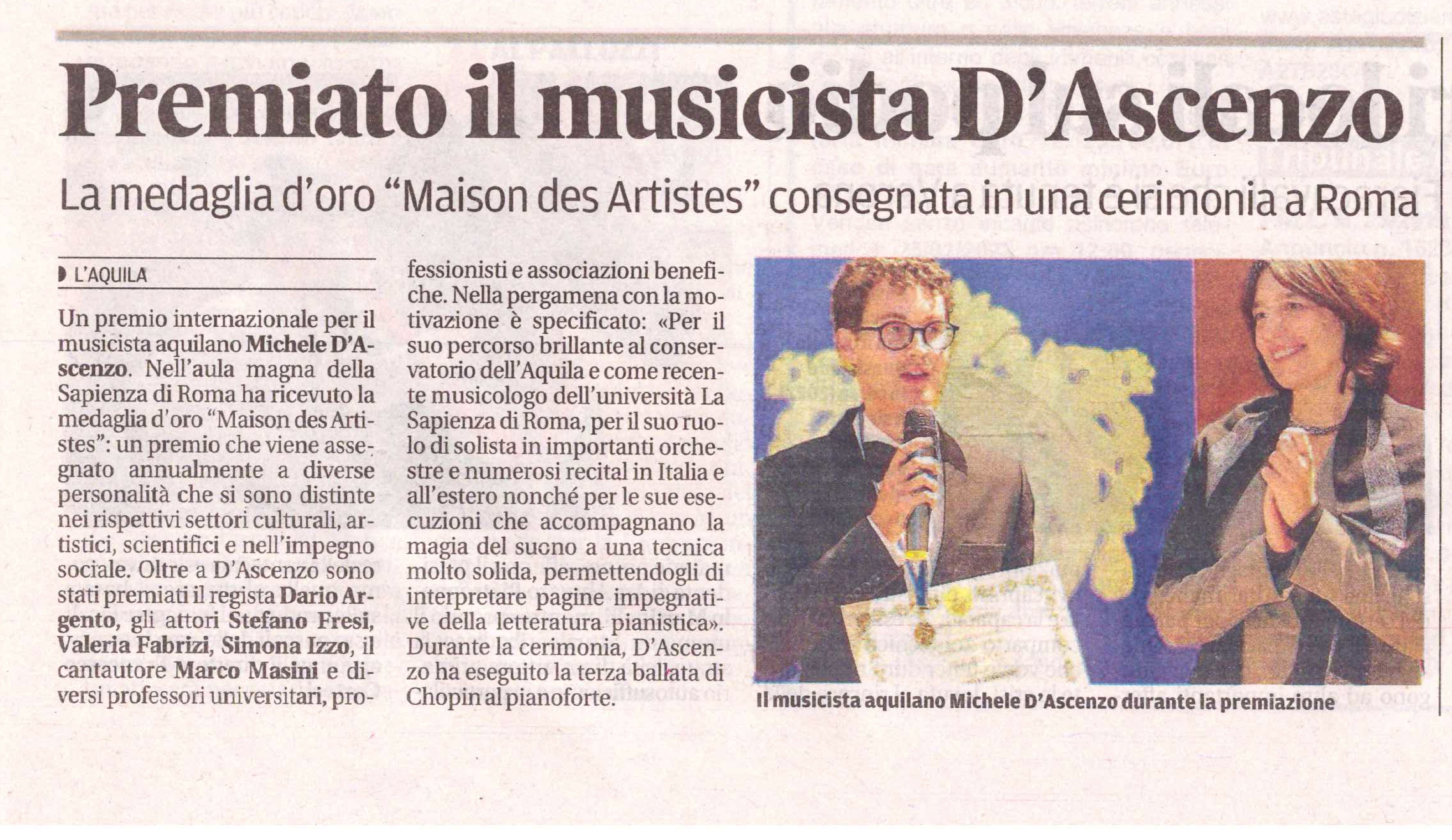
Il Centro
« Premiato il musicista D'Ascenzo » « Premiato il musicista D'Ascenzo »
27 November 2022
Annuncio dell'assegnazione del Premio Internazionale Medaglia d'Oro "Maison des Artistes" 2022 Announcement of the International Prize Gold Medal "Maison des Artistes" 2022
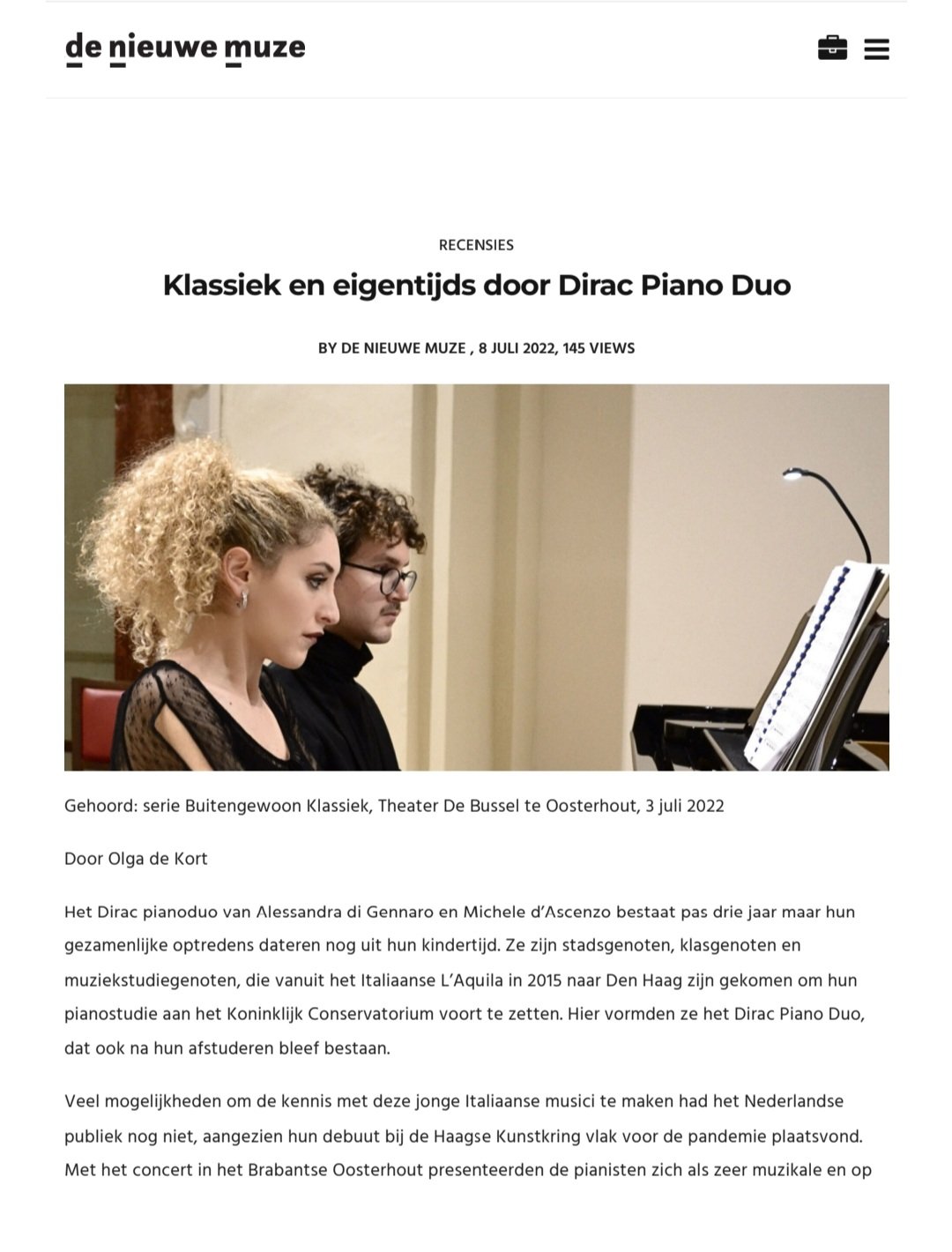
De Niuwe Muze
« Klassiek en eigentijds door Dirac Piano Duo » « Klassiek en eigentijds door Dirac Piano Duo »
8 July 2022
Olga de Kort
Recensione Concerto del Dirac Piano Duo al Theater de Bussel a Oosterhout-Breda (NL) Olga de Kort
Review on the concert of Dirac Piano Duo at the Theater de Bussel in Oosterhout-Breda (NL)
Per leggere l'articolo completo clicca
qui.Full article available
here.
« I pianisti si sono presentati come un duo a quattro mani molto musicale e perfettamente coordinato, che ha un'eccellente padronanza del repertorio sia classico che contemporaneo. [...] La pienezza del suono, l'unità ritmica e le dinamiche equilibrate sono state ulteriormente potenziate da un uso ponderato del pedale. Sooto le mani di Alessandra e Michele il pianoforte suonava come una vera orchestra. » « The pianists presented themselves as very musical and perfectly coordinated four-hands players, who have an excellent command of the classical as well the contemporary repertoire. [...] The fullness of the sound, rhythmic unity and balanced dynamics were further enhanced by a thoughtful use of the pedal. Under the hands of Alessandra and Michele the piano sounded like a true orchestra. »

Il Cittadino Oleggese
« "Venerdì musicali": successo per il pianista Michele D'Ascenzo » « "Musical Fridays": success for the pianist Michele D'Ascenzo »
23 March 2018
Recensione recital "Amici della Musica di Oleggio" Review on the recital for the "Amici della Musica" Association
« Il concerto di D'Ascenzo ha avuto un esito assai positivo e lunghi e calorosi applausi hanno chiuso la serata. […] Durante l'impegnativo programma il musicista aquilano ha mostrato una forte capacità di trasmettere sensazioni ed emozioni, coinvolgendo gli spettatori. Una bella serata dunque, a cui hanno fatto seguito molte richieste agli organizzatori di invitare nuovamente il giovane talento. » « The scheduled pianist was unable to take part in the concert and in her place another pianist, Michele D'Ascenzo, was invited. Michele D'Ascenzo on short notice demonstrated great professionality and virtuosity. D'Ascenzo's recital had a very positive outcome, long and warm applause ended the evening of "Young Talents" cycle. […] During the demanding program the musician showed a strong ability to convey feelings and emotions, involving the audience. So, a wonderful evening, ended with lots of requests from the public to the organizers to invite again this young talent. »
Arcipelago Milano
« Un abruzzese sul Lago d'Orta » « A pianist from Abruzzo on Lake Orta »
Paolo Viola
26 September 2017
Recensione Recital per Settembre Musicale di S. Giulio Review on the recital on S. Giulio Island
Per leggere l'articolo completo clicca
qui.Full article available
here.
Domenica si è concluso il sessantesimo Settembre Musicale a San Giulio, una delle chicche della meravigliosa provincia italiana che di provinciale non ha proprio nulla, anzi si direbbe proprio il contrario. Su questa minuscola isoletta del Lago d'Orta, che da sola vale il viaggio, pochi edifici (una basilica romanica, un antico monastero, alcune residenze dall'aria fra il rustico e l'aristocratico) si addensano intorno a una stradina che in cinque minuti a piedi la fa girare e vedere tutta.
[…] In casa Tallone, dunque, si svolge ogni anno questo Settembre Musicale a San Giulio che è stagione breve ma di altissima qualità tanto che l'esservi invitati a suonare è sempre motivo di orgoglio per gli interpreti; spesso si tratta di musicisti importanti, dalla fama consolidata, talvolta di giovani all'inizio della loro carriera.
E giovanissimo è il pianista Michele D'Ascenzo, nato e cresciuto all'Aquila, che l'altro giorno ha chiuso la stagione con un magnifico concerto, iniziato con Schubert (Sonata in la minore op. 42) e concluso con Prokof'ev (Sonata in do minore op. 29), che ci ha fatto riscoprire la sorprendente suite (non saprei come chiamarla altrimenti) dal curioso titolo Musica ricercata, scritta nei primi anni cinquanta da un Ligeti non ancora trentenne.
Michele D'Ascenzo è allievo del bravissimo maestro russo Vsevolod (detto Sheva) Dvorkin che, vivendo da anni a Como dove convergono allievi da mezza Europa per perfezionarsi con lui nello studio e nell'interpretazione dei classici del pianoforte, credo si ritenga ormai italiano a tutti gli effetti.
Il risultato della sua grande passione e competenza l'abbiamo potuto verificare proprio in questa occasione in cui il giovane D'Ascenzo ha sfoggiato, oltre alla perfetta padronanza della tastiera e al preciso controllo del suono, una considerevole lucidità interpretativa: nessuna sbavatura, né titubanze o incertezze, neppure nella difficilissima Sonata di Prokof'ev. Persino esagerato: vorremmo quasi suggerirgli di assecondare più il cuore e l'istinto che la ragione, di "lasciarsi andare" così come l'abbiamo sentito nello Scherzo della Sonata di Schubert che palesemente lo emozionava e lo divertiva.
Che gioia sentire e vedere (perché la musica dal vivo, specialmente in ambienti piccoli, offre anche questo piacere!) un ragazzo di ventitré anni affrontare grandi classici con l'umiltà che essi richiedono ma anche con la sicurezza che deriva dalla severità e profondità dei propri studi!
Come ci si può lamentare, di fronte a questi esempi - e, lo vediamo, sono tanti - del modo in cui crescono le nuove generazioni? E non si tratta di ragazzi privilegiati, che hanno trovato le strade aperte dalla famiglia o dalla sorte (in questo caso ad ostacolarlo si è messo di mezzo pure il terremoto!), ma di ragazzi con le idee chiare, ricchi di passione e di determinazione, capaci di affrontare fatiche e sacrifici.
Per affrontare la complessità della Musica Ricercata di Ligeti, infatti, non occorre solo "avere tre o cinque mani" come sostiene Alfred Brendel, ma dedicarle una quantità impressionante di ore di studio e soprattutto possedere una tecnica perfetta. È composta da undici pezzi così organizzati: il primo usa esclusivamente una nota - il la - che salta e si raddoppia su diverse ottave e solo alla fine aggiunge una seconda nota, il re; il secondo è formato da tre note, il terzo da quattro e così via finché l'undicesimo, dove sono presenti tutte e dodici le note della scala cromatica, è una quasi fuga / quasi dodecafonica.
Detto così può sembrare una provocazione mentre si tratta di un magnifico pezzo che dà l'emozione di confondersi fra il mondo sonoro di Bach e quello di Schönberg! Ottimo anche il bis, la Fuga XXI in si bemolle maggiore dal secondo libro del Clavicembalo ben temperato di Bach, con la quale D'Ascenzo ha non solo dimostrato la propria maturità musicale, ma ci ha anche ricordato che la chiarezza e la compostezza dell'esecuzione non devono diventare freddezza e tradire il carattere ascetico e contemplativo che è ragion d'essere dell'opera bachiana.
Questo concerto ha anche messo in evidenza l'abissale distanza della scuola europea da quella che accomuna i ragazzi che vengono dall'Estremo Oriente (Cina, Giappone, Corea), più che perfetti tecnicamente ma spesso culturalmente estranei alla musica occidentale. Mentre gli orientali sono aiutati dal fatto di esercitare su di noi il fascino del loro venire da lontano, i ragazzi europei - propheti in patria - fanno grande fatica a farsi conoscere e riconoscere. Andrebbero sostenuti e valorizzati anche perché rappresentano straordinari esempi di come ci si può costruire il futuro in epoche così complicate.
Last Sunday the 60th edition of "Settembre Musicale a San Giulio" ended. This festival is one of the gems of the marvellous Italian province, which has nothing to do with provincialism: on the contrary, one would say the opposite!
[…] Every year the «Settembre Musicale a San Giulio» takes place in this house [Villa Tallone]; it is a short concert season, but of the highest quality. It is a great honour and source of pride for a musician to be invited to play in this festival. On the stage there are often musicians of a well-established fame, but sometimes also young artists at the beginning of their career.
One of the youngest is Michele D'Ascenzo, born and raised in L'Aquila, who ended the concert series with a gorgeous recital last Sunday. He started playing the Sonata in A minor op. 42 by Schubert and finished with the Sonata in C minor op. 29 by Prokofiev, he made us rediscover the astonishing suite by the curious title «Musica ricercata», written by the nearly 30-years-old Ligeti in the first 1950s.
Michele D'Ascenzo studies with the great Russian pedagogue Vsevolod Dvorkin, who lives in Como where lots of students move from all over Europe to master their technical and musical skills with him. We could check the result of his great passion and proficiency in this occasion. Besides the perfect mastery of the keyboard and the precise control of the sound, the young D'Ascenzo showed off a remarkable interpretative clarity: no wrong notes, no hesitancies, nor uncertainties, neither in the very difficult Sonata by Prokofiev. Even exaggerated: we would nearly suggest him to follow more the heart and the instinct than his mind, to "let himself go", as we listened in the Scherzo of the Sonata by Schubert, which clearly moved and amused him.
What a joy listening and seeing a 23-year-old guy approaching the great classics with the humbleness that they deserve, but also with the security that comes from the strictness and the depth of his own studies! How can one complain about the way in which the new generations are growing up, faced with these examples? And we are not dealing with a privileged guy, with possibilities opened by the family or the fate (in this case, an earthquake got in his way, too!), but we are dealing with guys with clear ideas, full of passion and determination, able to face efforts and sacrifices.
In fact, one needs not only «three or five hands» (as Alfred Brendel states) to solve the complexity of "Musica Ricercata" by Ligeti, but also to spend a shocking amount of time of practice and, above all, one needs to have a perfect technique. This suite is made up of eleven little pieces, organized in this way: the first one has only one note, the A, which jumps and redoubles on different octaves and only in the end reaches a second note, the D; the second piece consists of three notes, the third one of four notes and so on. The last one, the eleventh, where all the twelve notes of the chromatic scale are presented, is almost a dodecaphonic fugue. According to my words it could appear as a provocation, but instead it is a superb piece, which gives the emotion of mixing the sound world of Bach and the one of Schoenberg! The encore was excellent, too: the Fugue no. 21 in B flat Major from the second Book of the Well-Tempered Clavier by Bach. Here D'Ascenzo showed not only his own musical maturity, but also reminded us that the clarity and the composure of the performance do not have to become coldness and betray the ascetic and contemplative nature of Bach music.
This concert underlined also the great distance between the European School and the Asian Schools (Chinese, Japanese, Korean), much more perfect technically, but often unrelated to the European culture and music. While the Asians are supported by the charm they have on us because they come from faraway places, the European young musicians struggle very much to make themselves known. They should be supported and appreciated also because they represent extraordinary examples of how to build the future in these difficult days.
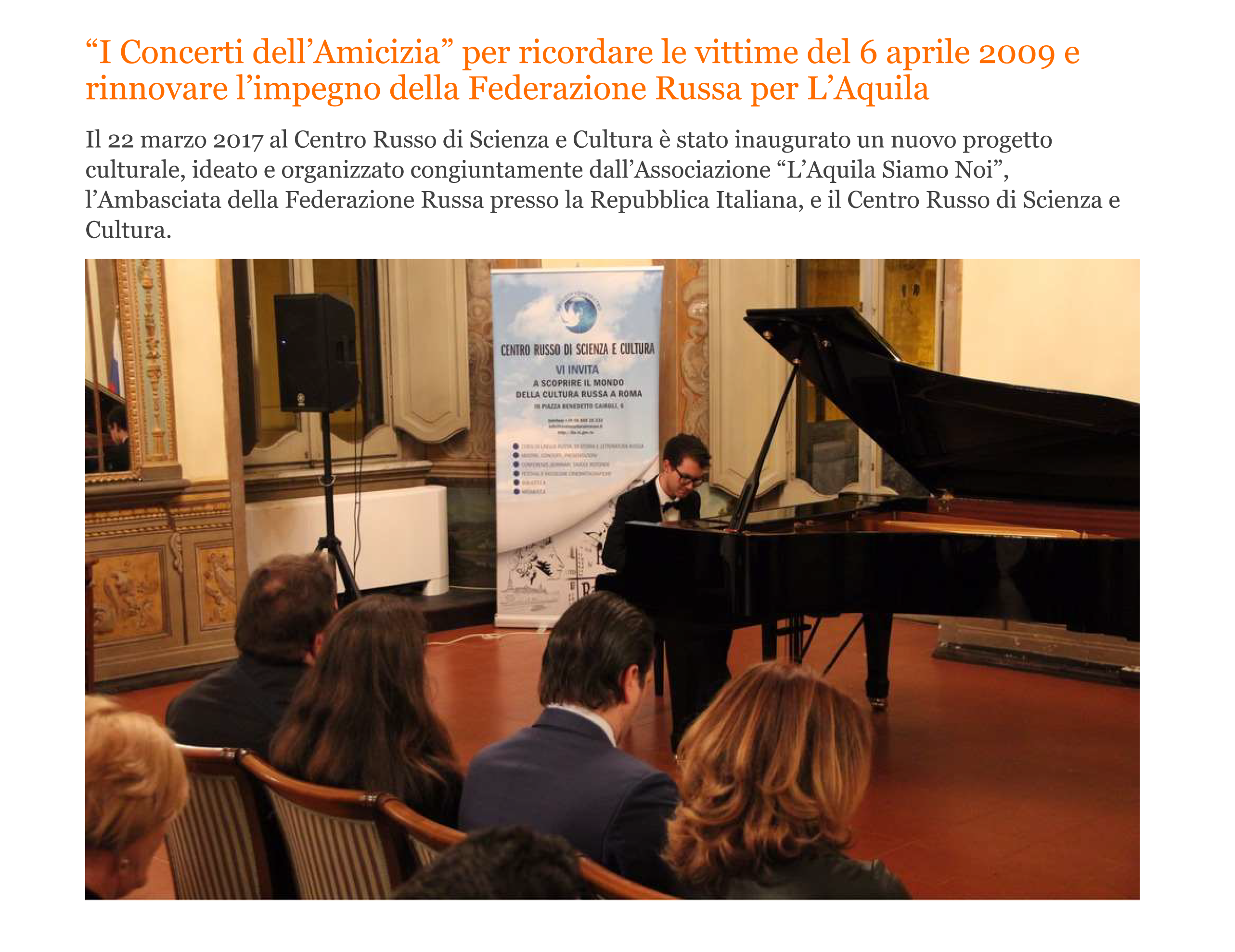
Centro Russo di Scienza e Cultura di Roma
« I Concerti dell'Amicizia » « The Concerts of Friendship »
22 March 2017
Recensione Recital Ambasciata Russa Review on the Recital for the Russian Embassy in Rome
Per leggere l'articolo completo clicca
qui.Full article available
here.
« Molto gradita è stata la performance del virtuoso pianista Michele D'Ascenzo, giovane promessa della musica classica italiana. Il musicista ha proposto agli ospiti del Centro una delle Rapsodie Ungheresi di Franz Liszt, seguita dalle Variazioni per pianoforte su un tema originale in re maggiore di Johannes Brahms, ed infine dalla Sonata per pianoforte n. 4 di Sergej Prokofiev. La sua esibizione ha suscitato l'ammirazione del pubblico comprovata da ripetuti applausi. » « The performance of the young virtuoso Michele D'Ascenzo was greatly appreciated. He is an up-and-comer in the Italian classic music scene. He played for the guests of the Cultural Centre a Hungarian Rhapsody by Liszt, followed by the Variations on an original theme in D Major by Brahms and by the Piano Sonata no. 4 by Prokofiev. His concert aroused the admiration of the public, proved by repeated applause »
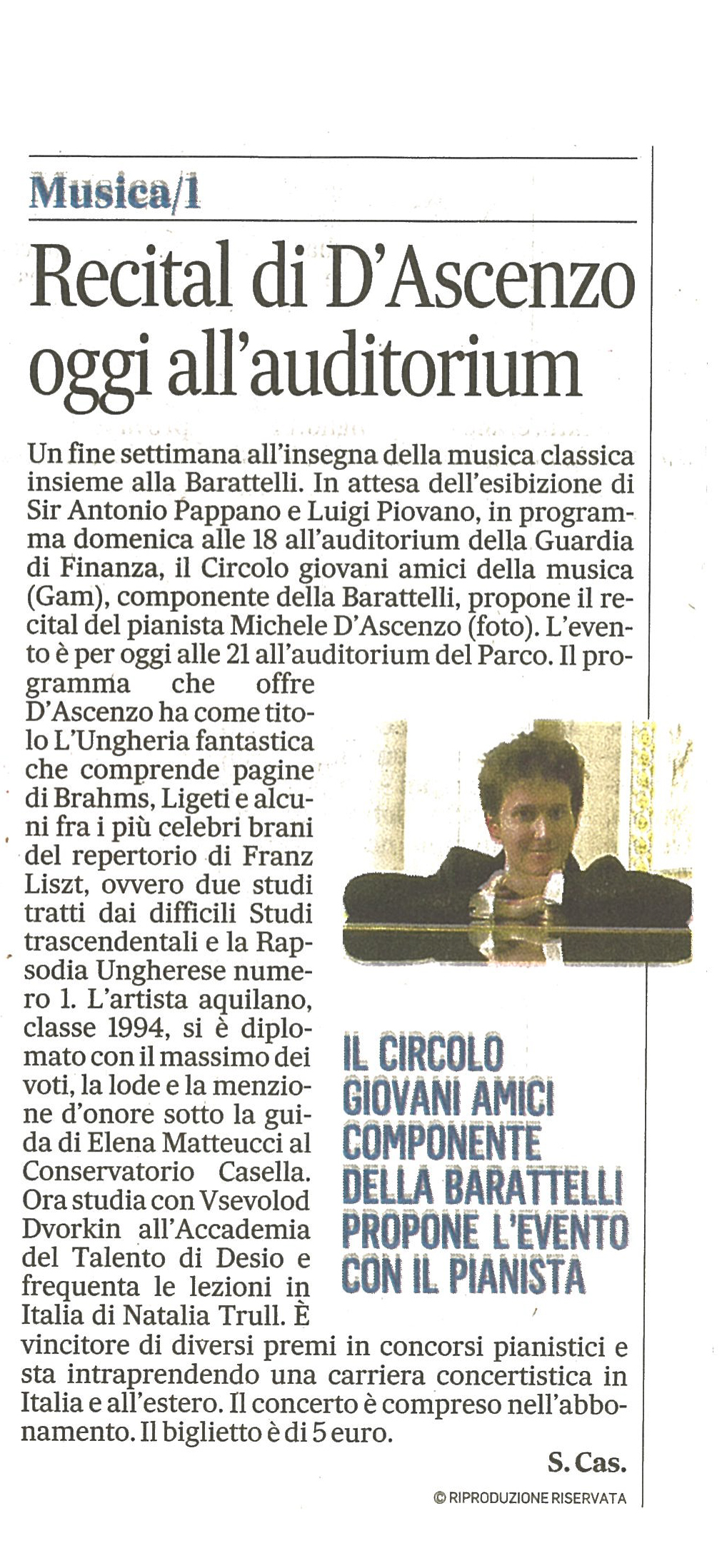
IL MESSAGGERO ABRUZZO
« Recital di D'Ascenzo oggi all'auditorium » « Recital of D'Ascenzo today at the Auditorium »
Stefano Castellani
12 January 2017
Recital per il Circolo Giovani Amici della Musica - Società dei Concerti Barattelli L'Aquila Announcement of the recital for the Concert Society in L'Aquila
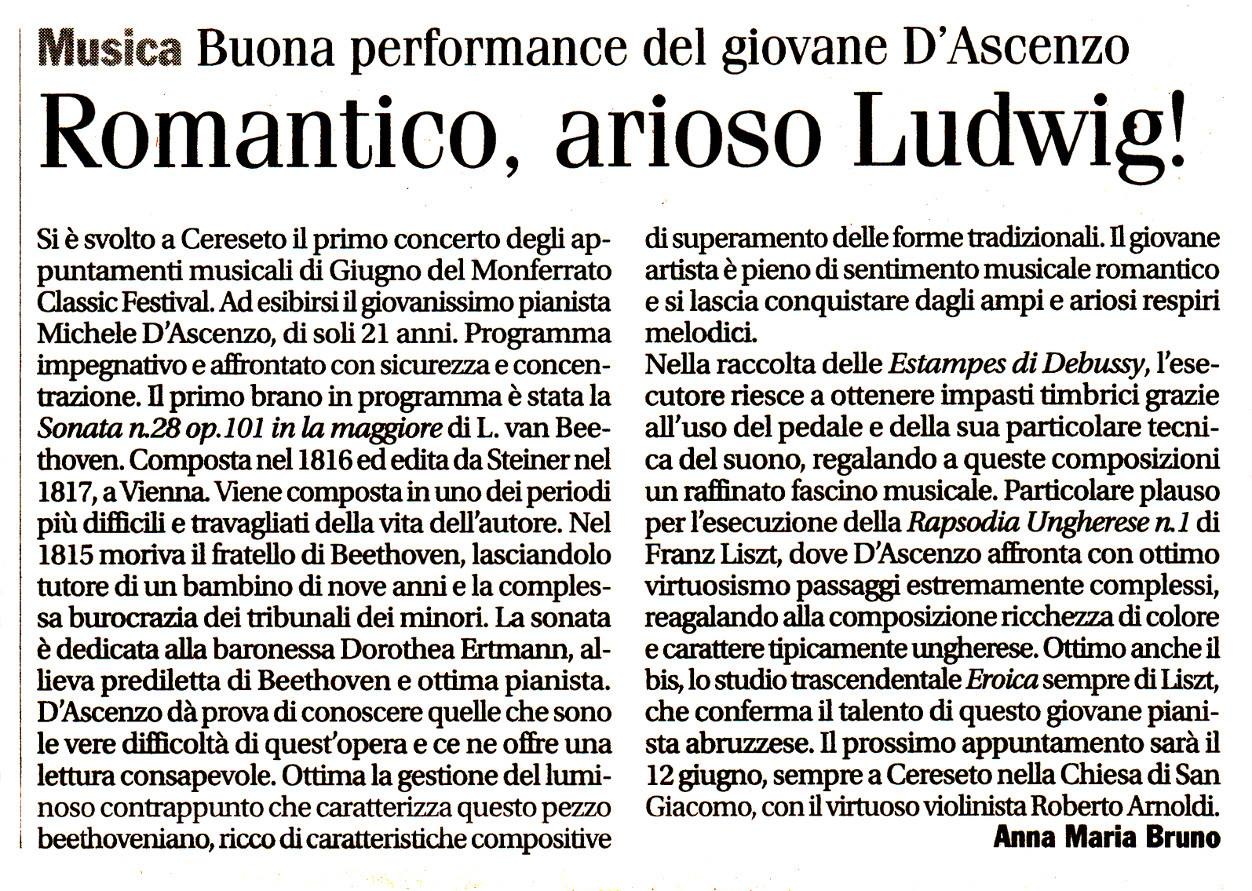
IL MONFERRATO
« Romantico, arioso Ludwig! » « Romantic, "arioso" Ludwig! Good performance of the young D'Ascenzo »
Anna Maria Bruno
7 June 2016
Recensione Recital Monferrato Classic Festival Review on the recital for Monferrato Classic Festival
« Ottima la gestione del luminoso contrappunto che caratterizza questo pezzo beethoveniano. […] Particolare plauso per l'esecuzione della Rapsodia Ungherese n.1 di Franz Liszt, dove D'Ascenzo affronta con ottimo virtuosismo passaggi estremamente complessi, regalando alla composizione ricchezza di colore e carattere tipicamente ungherese. » « The first piece was the Sonata no. 28 op. 101 in A Major by Ludwig van Beethoven, composed in 1816 and published by Steiner in Vienna the following year. […] D'Ascenzo proved to know the real difficulties of this masterwork, giving an aware interpretation. The conduction of the bright counterpoint was excellent. […] In "Estampes" by Debussy, the musician is capable of creating timbral effects thanks to the use of the pedal and to his particular sound technique, thus giving these pieces a refined musical charm. A special praise to the performance of the first Hungarian Rhapsody by Liszt, where D'Ascenzo faces extremely complex passages with first-class virtuosity, giving to the composition richness of colours and a typical Hungarian trait. The encore was excellent, too: the Transcendental Etude "Eroica" by Liszt, which confirms the talent of this young pianist from Abruzzo »
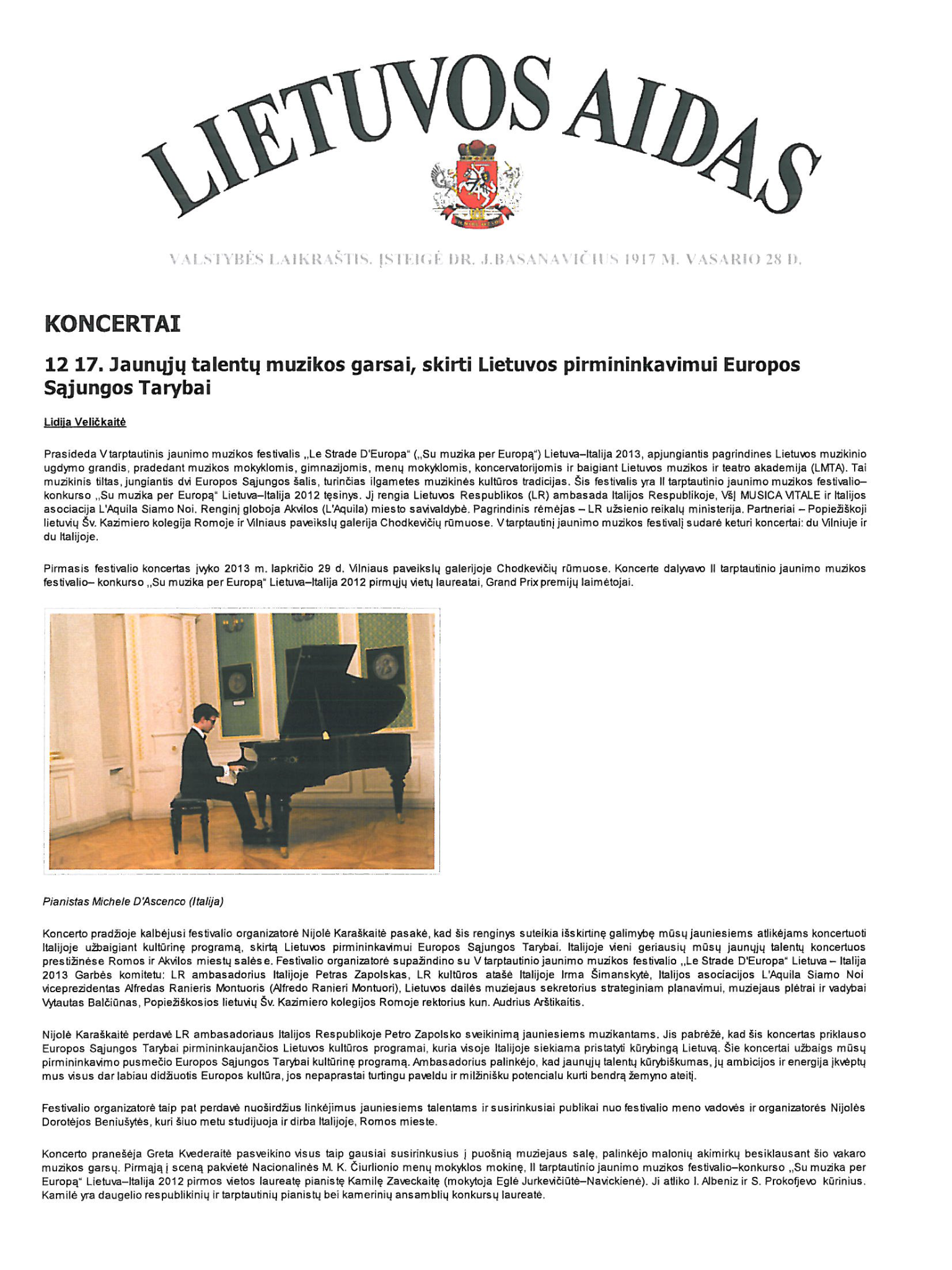

LIETUVOS AIDAS
« Jaunuju talentu muzikos garsai, skirti Lietuvos pirmininkavimui Europos Sajungos Tarybai » « Young music talents play for the Lithuanian Presidency of the Council of the European Union »
Lidija Velickaite
17 December 2013
Recensione Recital Vilnius Review on the recital in Vilnius
« Il programma del concerto è stato eseguito con grande virtuosismo; numerosi gli applausi e le acclamazioni del pubblico » « The concert program was performed with high virtuosity. Lots of acclamations came from the audience »